From Service Desk to Strategic Partner: Elevating the Role of Data Teams
The role of data teams in organizations has transformed dramatically. No longer confined to the traditional service desk model, where tasks are reactive and transactional, you now have the opportunity to redefine your impact. Businesses increasingly demand strategic insights that drive decisions and fuel growth. Yet, while 98.6% of executives aim for a data-driven culture, only 32.4% achieve it. This gap highlights the need for data teams to step up as strategic partners, shaping business directions and unlocking untapped potential. By embracing Data Leadership, you can lead this shift and position yourself as an indispensable force in your organization.

Key Takeaways
Transitioning from a service desk to a strategic partner requires a shift from reactive problem-solving to proactive strategy development.
Embrace a data-driven approach to anticipate challenges and provide actionable insights that align with organizational goals.
Foster collaboration across departments to break down silos and ensure data insights contribute to broader business objectives.
Invest in developing both technical and business skills within your team to enhance their ability to drive strategic initiatives.
Measure success through clear metrics that demonstrate the impact of your data-driven efforts on organizational performance.
Continuously improve by seeking feedback, adapting to industry trends, and investing in ongoing training for your team.
Position yourself as a trusted advisor by deepening your understanding of the business and effectively communicating data insights.
Understanding the Transition from Service Desk to Strategic Partner
The Limitations of the Traditional Service Desk Model
The traditional service desk model often limits your potential. It focuses on reactive tasks, like resolving tickets or addressing immediate issues. This approach keeps you in a cycle of responding to problems instead of preventing them. Many organizations struggle to see beyond this model, leaving data teams under-resourced and undervalued. When your team operates this way, it becomes difficult to demonstrate the true value you bring to the organization.
A service desk mentality can also create silos. You may find yourself disconnected from the broader business strategy, which prevents you from contributing to long-term goals. Without alignment, your work feels transactional rather than transformational. This mindset not only limits your growth but also restricts the impact you can have on the organization.
"Under-resourced teams result from a service desk mentality."
— A common challenge faced by data teams today.
Breaking free from this model requires a shift in perspective. You need to move from being seen as a cost center to becoming a strategic partner. This transition starts with recognizing the limitations of the traditional service desk and understanding the opportunities that lie ahead.
The Need for a Data-Driven Service Desk Approach
To elevate your role, you must embrace a data-driven approach. A data-driven service desk doesn’t just solve problems—it anticipates them. By analyzing ticket data, you can uncover patterns and trends that inform proactive strategies. For example, identifying recurring issues allows you to address root causes, reducing downtime and improving efficiency.
Many organizations don’t know where to start when leveraging ticket data. This is where you can lead the way. Begin by quantifying the business value of your operations. Show how your insights drive measurable outcomes, such as cost savings or improved customer satisfaction. A data-driven service desk transforms your team into a valuable asset that supports organizational success.
Shifting to this approach may seem challenging, but the rewards are worth it. A data-driven mindset positions you as a problem-solver and a strategist. It enables you to collaborate more effectively with other departments, fostering a culture of innovation and continuous improvement. By adopting this proactive stance, you not only enhance your team’s reputation but also contribute to the overall growth of the organization.
"The benefits of becoming data-driven outweigh the risks for many IT leaders."
— A powerful reminder of the value of this transformation.
When you embrace a data-driven service desk, you unlock new possibilities. You move beyond reactive tasks and start driving meaningful change. This shift not only elevates your role but also sets the stage for long-term success.
Defining the Role of Data Teams as Strategic Partners
What It Means to Be a Strategic Partner
Becoming a strategic partner means stepping beyond operational tasks and embedding yourself into the core of your organization’s decision-making process. As a data team, your role evolves from simply providing reports to actively shaping the direction of the business. You no longer just answer questions; you help ask the right ones. This shift requires you to align your efforts with the company’s goals and demonstrate how your insights drive measurable outcomes.
Strategic partners focus on creating value. You achieve this by leveraging a data-driven methodology to uncover opportunities, mitigate risks, and optimize processes. For instance, instead of merely reporting sales figures, you analyze trends to recommend strategies that boost revenue. Your ability to connect data insights with actionable business strategies transforms you into a trusted advisor.
"Strategic discussions in data leadership are vital."
— Tristan Burns, Data Leadership Expert
To succeed in this role, you must cultivate a deep understanding of your organization’s objectives. Engage with stakeholders to identify their challenges and priorities. Use this knowledge to tailor your data solutions, ensuring they address real business needs. By doing so, you position yourself as an indispensable part of the team, driving both short-term wins and long-term growth.
Characteristics of Data-Driven Strategic Teams
Data-driven strategic teams share distinct traits that set them apart. These characteristics enable you to deliver consistent value and establish a strong foundation for success:
Proactive Problem-Solving
You anticipate challenges before they arise. By analyzing patterns and trends, you identify potential issues and implement solutions early. This proactive approach minimizes disruptions and enhances efficiency.Collaborative Mindset
Effective collaboration is at the heart of a strategic partnership. You work closely with other departments, breaking down silos and fostering a culture of shared intelligence. This teamwork ensures that data insights align with broader organizational goals.Business Acumen
A strong understanding of business operations allows you to connect data insights with actionable strategies. You don’t just present numbers; you tell a story that resonates with decision-makers and drives meaningful action.Adaptability
The business landscape evolves rapidly. You stay agile, embracing new tools and methodologies to keep pace with changing demands. This adaptability ensures that your team remains relevant and effective.Focus on Impact
You measure success by the tangible outcomes you deliver. Whether it’s cost savings, increased revenue, or improved customer satisfaction, you prioritize results that matter to the organization.
Building these traits within your team requires intentional effort. Invest in training to enhance technical skills and business literacy. Encourage open communication to foster collaboration and innovation. By embodying these characteristics, you elevate your role and solidify your position as a strategic partner.
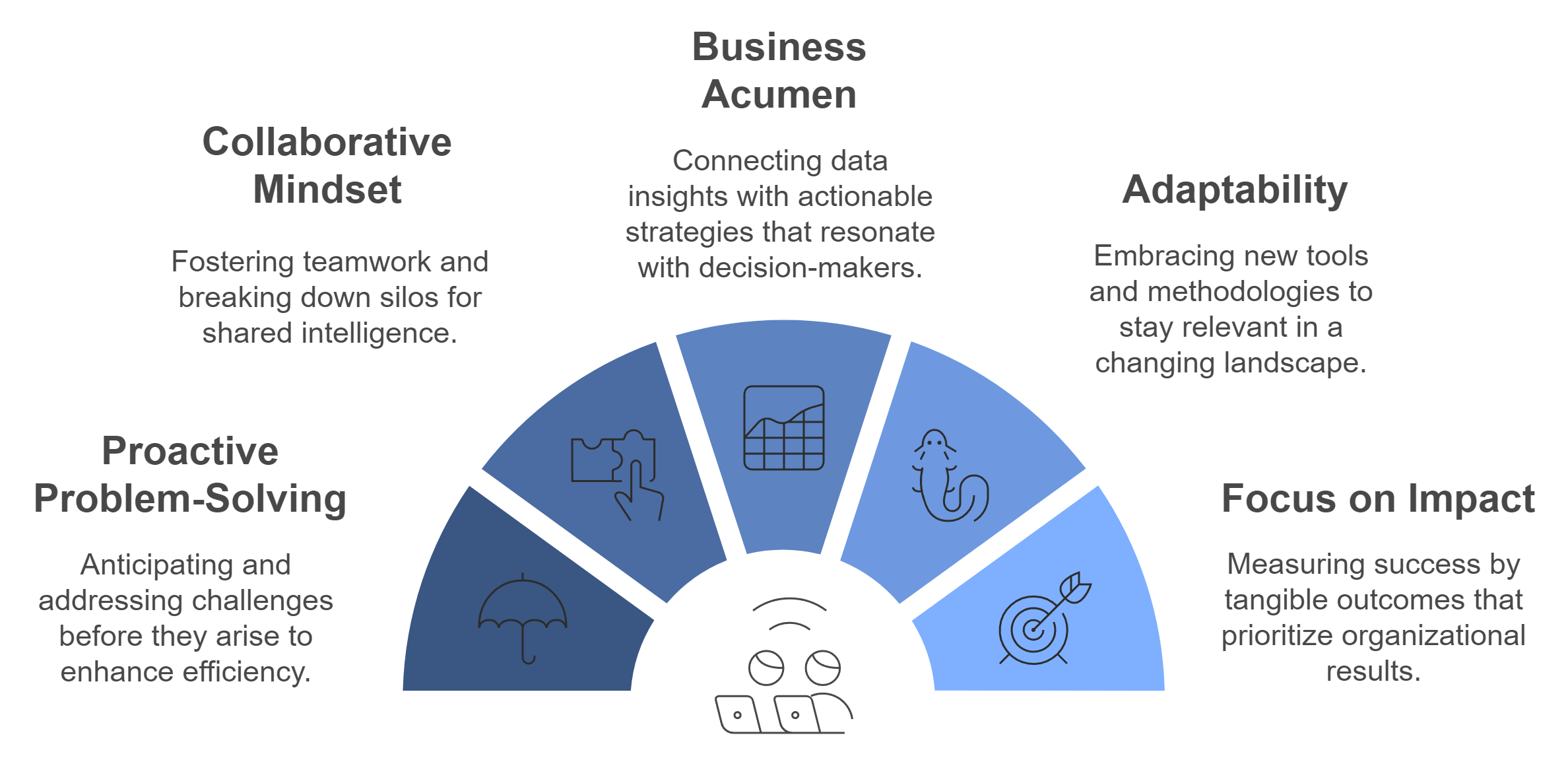
"Building a strong data analytics team helps in developing data maturity and communicating real-time data insights to the C-suite for effective decision-making."
When you embrace these qualities, you unlock the full potential of a data-driven methodology. Your team becomes a catalyst for change, driving innovation and delivering value at every level of the organization. This transformation not only benefits your team but also positions your company for sustained success.
Benefits of Transitioning to a Data-Driven Service Desk
Organizational Benefits
Transitioning to a data-driven service desk unlocks immense potential for your organization. By leveraging data, you can quantify the business value of your operations and establish clear, measurable goals. This clarity allows you to align your efforts with strategic objectives, ensuring every action contributes to the broader mission.
A data-driven operation enhances decision-making across the board. With access to actionable insights, you can make informed choices about services, tools, and infrastructure. For example, analyzing ticket data helps you identify recurring issues, enabling you to allocate resources effectively and reduce downtime. This proactive approach not only improves efficiency but also elevates the overall user experience.
"Data-driven service desks provide concrete justification for budgetary requests and IT spending decisions."
When your service desk operates with a data-driven mindset, it becomes a cornerstone of business intelligence. You gain the ability to measure the impact of your work, demonstrating tangible outcomes like cost savings or increased productivity. This visibility strengthens your position within the organization, transforming your team into a strategic partner that drives success.
Benefits for Data Teams
For your data team, adopting a data-driven operation brings significant advantages. It shifts your role from reactive problem-solving to proactive strategy development. Instead of merely addressing issues, you anticipate them, creating solutions that prevent disruptions before they occur. This shift not only enhances your team's reputation but also fosters a sense of purpose and achievement.
A data-driven approach empowers you to showcase the value of your work. By connecting your efforts to measurable business outcomes, you highlight your contribution to the organization's success. This recognition can lead to increased support, better resources, and more opportunities for growth.
Collaboration becomes more effective when you embrace data-driven methodologies. Working closely with other departments, you break down silos and foster a culture of shared intelligence. This teamwork ensures that your insights align with organizational goals, amplifying their impact.
"Data-driven operations enable teams to balance workloads and allocate resources efficiently."
Adopting this approach also enhances your team's adaptability. With access to advanced analytics, you stay ahead of industry trends and evolving business needs. This agility ensures your team remains relevant and continues to deliver value in a rapidly changing environment.
By transitioning to a data-driven service desk, you elevate your role, enhance your impact, and position yourself as a strategic partner. This transformation benefits not only your team but also the entire organization, paving the way for sustained success.
Overcoming Challenges in Transitioning to a Data-Driven Service Desk
Shifting the Service Desk Mindset
Changing the mindset of your team is the first step in transitioning to a data-driven service desk. Many data teams operate under a reactive model, focusing on solving immediate problems rather than preventing them. This approach limits your ability to demonstrate value and keeps you stuck in a cycle of short-term fixes. To break free, you must embrace a proactive mindset that prioritizes long-term impact over quick resolutions.
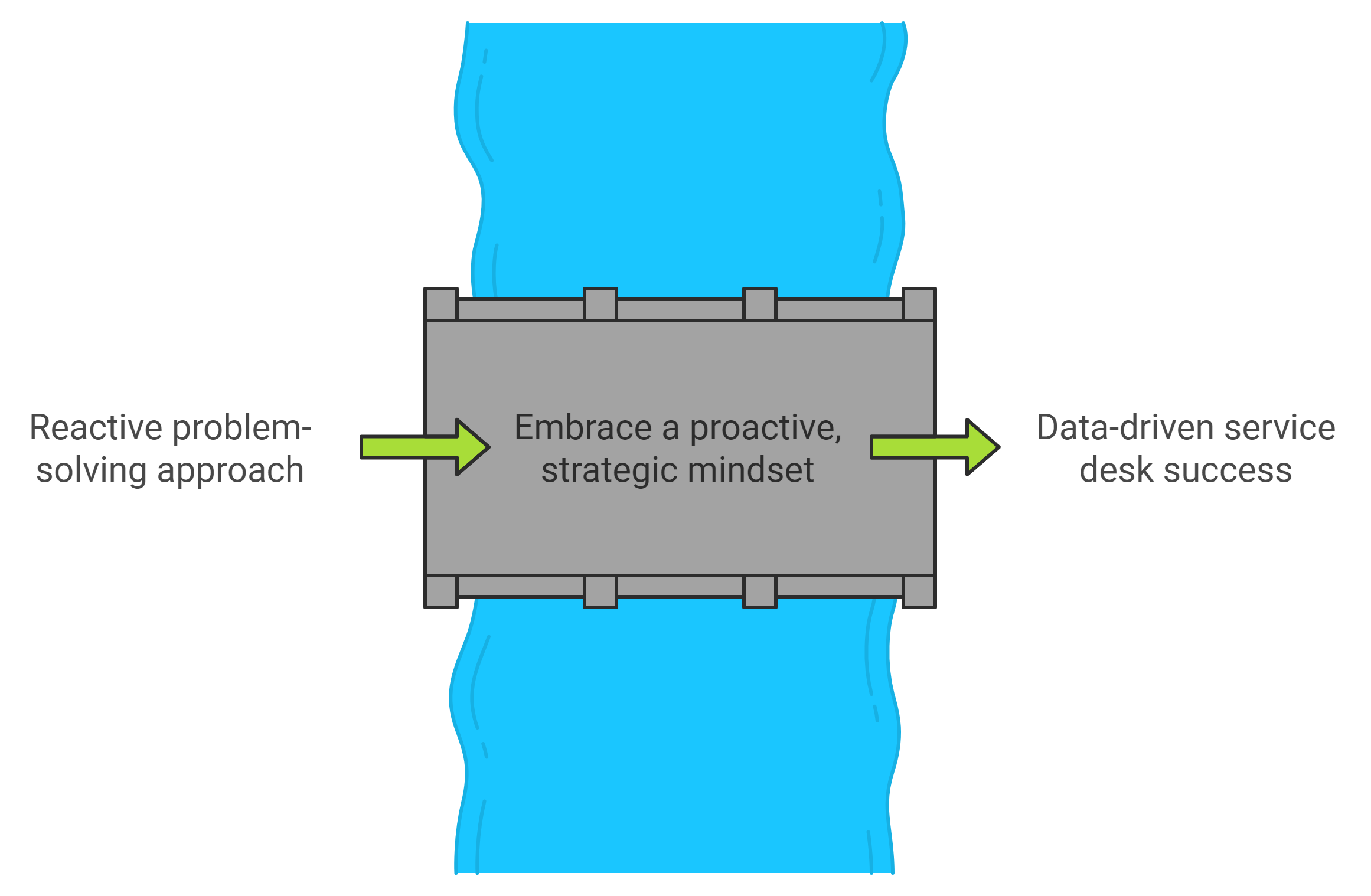
Start by redefining how you view your role. Instead of seeing yourself as a problem-solver, position yourself as a strategist. Engage with stakeholders to understand their goals and challenges. Use this knowledge to align your efforts with the organization’s broader objectives. When you connect your work to measurable outcomes, you shift perceptions and establish yourself as a valuable partner.
"73% of data leaders feel excluded from strategic decisions. This exclusion highlights the need for a mindset shift to bridge the gap."
Encourage your team to adopt this new perspective by fostering a culture of curiosity and innovation. Challenge them to think beyond immediate tasks and explore how their insights can drive meaningful change. Celebrate successes that result from proactive strategies, reinforcing the value of this approach. By shifting the mindset of your service desk, you pave the way for a more impactful and rewarding role within your organization.
Addressing Skill Gaps in Data Teams
Skill gaps often hinder the transition to a data-driven service desk. Many data teams excel in technical expertise but lack the business acumen and communication skills needed to thrive as strategic partners. Bridging these gaps is essential for unlocking your team’s full potential.
Begin by identifying the specific skills your team needs to succeed. These may include advanced analytics, storytelling with data, or understanding business operations. Once you’ve pinpointed these areas, invest in targeted training programs. Workshops, online courses, and mentorship opportunities can help your team develop the competencies required for this transition.
"Data literacy among stakeholders remains low, creating barriers to effective collaboration. Addressing this gap strengthens your team’s ability to drive change."
Encourage cross-department collaboration to enhance your team’s understanding of the organization. Working closely with other departments exposes your team to different perspectives and challenges, fostering a deeper connection to the business. This collaboration also builds trust and strengthens relationships, positioning your team as a reliable partner.
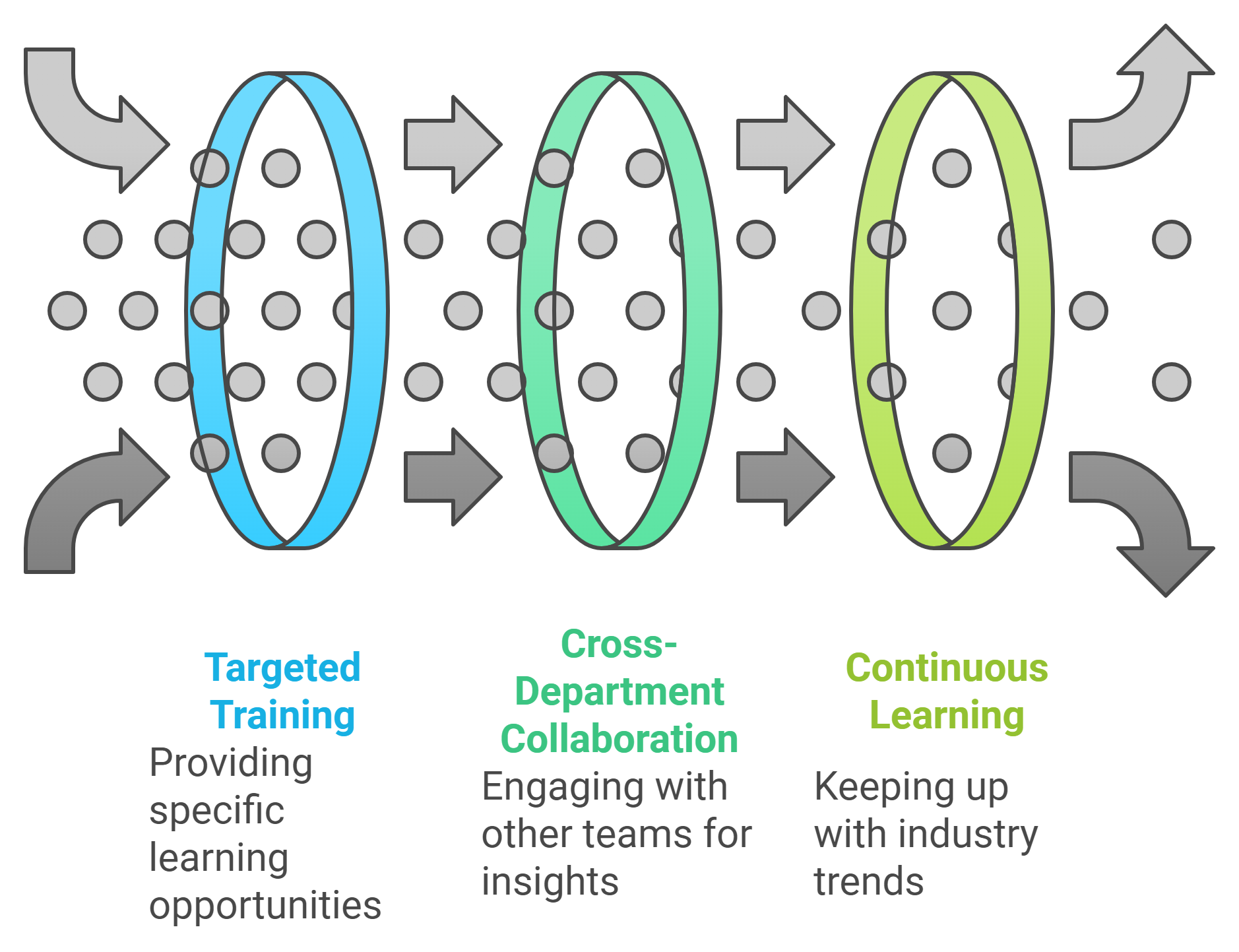
Promote continuous learning within your team. The business landscape evolves rapidly, and staying ahead requires adaptability. Encourage your team to stay informed about industry trends and emerging technologies. This commitment to growth ensures your team remains relevant and capable of delivering value in a dynamic environment.
By addressing skill gaps, you empower your team to transition effectively to a data-driven service desk. This transformation not only enhances your team’s capabilities but also elevates your role within the organization, driving long-term success.
Actionable Steps for Transitioning to a Data-Driven Service Desk
Deepening Business Understanding
To transition effectively, you must first deepen your understanding of the business. Knowing the goals, challenges, and priorities of your organization allows you to align your efforts with its strategic objectives. This alignment ensures that your work delivers meaningful value.
Start by engaging with stakeholders across departments. Ask questions about their pain points and objectives. Listen actively to uncover areas where your data expertise can make a difference. For example, if a sales team struggles with forecasting, your insights can help them identify trends and improve accuracy. By addressing real challenges, you position yourself as a trusted partner.
Take time to study the industry landscape. Learn about market trends, competitors, and customer behaviors. This knowledge helps you connect data insights to broader business strategies. When you understand the bigger picture, you can provide recommendations that drive growth and innovation.
"Transitioning to a data-driven Service Desk model requires dedication, but forming a carefully planned strategy can help companies minimize the period of trial and error."
— Milestone Tech
Deepening your business understanding also involves improving communication. Use clear, concise language when presenting data. Avoid technical jargon that may confuse non-technical stakeholders. Instead, focus on telling a story with your insights. Show how your findings impact the organization’s success. This approach builds trust and strengthens your role as a strategic partner.
Leveraging Advanced Data Analytics
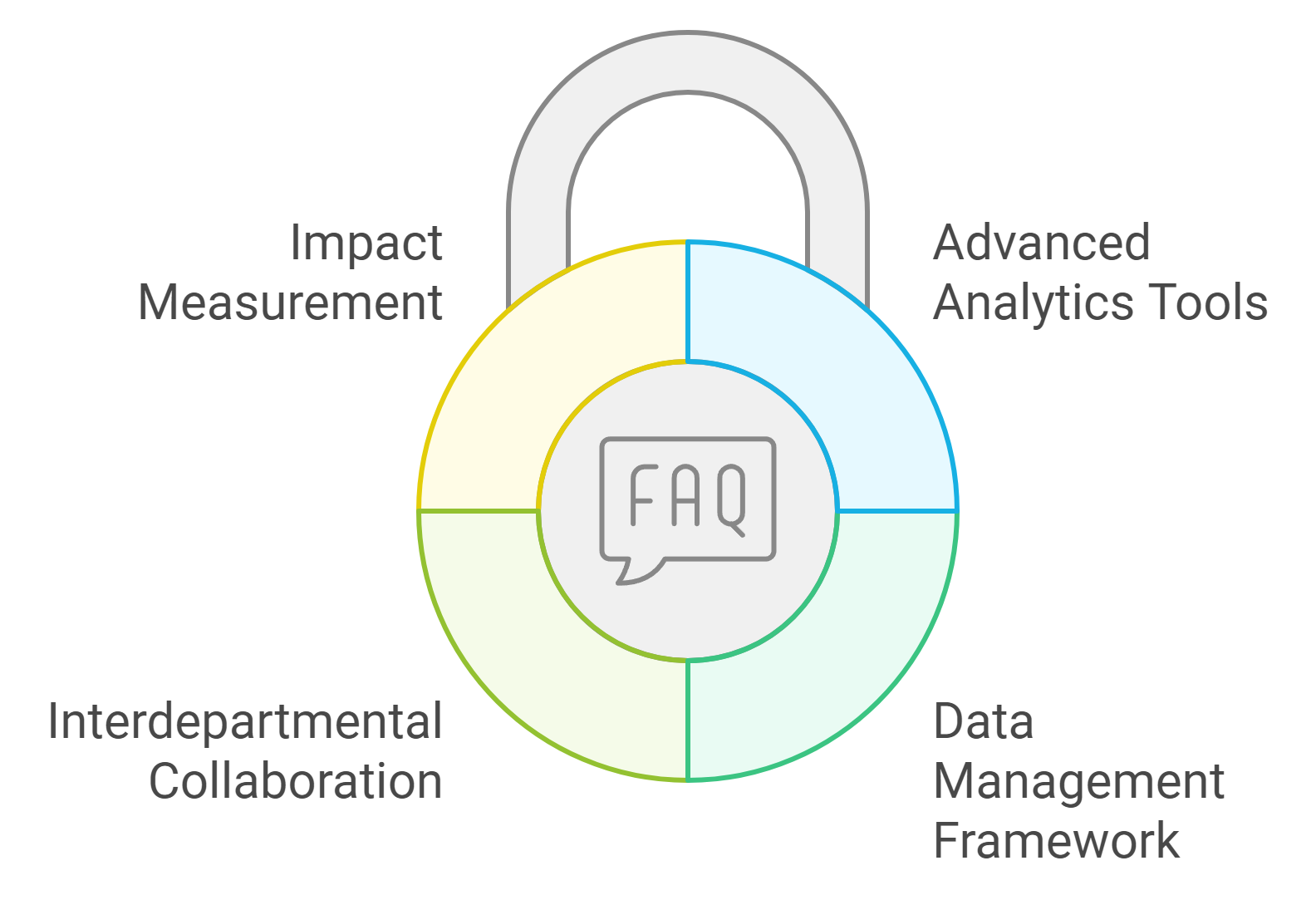
Advanced data analytics is the cornerstone of a data-driven Service Desk. By harnessing its power, you can uncover patterns, predict outcomes, and make informed decisions. This capability transforms your team from reactive problem-solvers to proactive strategists.
Begin by investing in the right tools and technologies. Modern analytics platforms offer features like predictive modeling, real-time dashboards, and automated reporting. These tools streamline your processes and enhance your ability to deliver actionable insights. For instance, analyzing ticket data can reveal recurring issues, enabling you to address root causes and prevent future disruptions.
Focus on building a robust data management framework. Ensure that your data is accurate, consistent, and accessible. Poor data quality undermines your efforts and erodes trust. Implement best practices for data governance to maintain integrity and reliability.
Collaboration plays a vital role in leveraging data analytics. Work closely with other departments to integrate their data into your analysis. This collaboration provides a holistic view of the organization, allowing you to identify opportunities and risks more effectively. For example, combining customer feedback with operational data can help you improve service delivery and enhance user satisfaction.
"Data-driven operations enable teams to balance workloads and allocate resources efficiently."
Finally, use analytics to measure your impact. Track key performance indicators (KPIs) that align with organizational goals. Share these metrics with stakeholders to demonstrate the value of your work. When you quantify your contributions, you solidify your position as an indispensable asset.
Building Strategic and Communication Skills
Strategic and communication skills are essential for elevating your role. These skills enable you to connect data insights with business objectives and convey your findings effectively.
Start by developing a strategic mindset. Think beyond immediate tasks and focus on long-term goals. Identify ways to apply insights to drive innovation and efficiency. For example, instead of simply reporting on system downtime, propose solutions to reduce it. This proactive approach positions you as a forward-thinking leader.
Enhance your communication skills to bridge the gap between technical and non-technical audiences. Tailor your message to suit your audience. When speaking to executives, emphasize the business impact of your insights. When collaborating with peers, dive into the technical details. This adaptability ensures that your message resonates with everyone.
Storytelling is a powerful tool for effective communication. Use narratives to make your data analysis relatable and compelling. Highlight the problem, present your findings, and propose actionable solutions. This structure keeps your audience engaged and drives home the importance of your work.
Invest in continuous learning to stay ahead. Attend workshops, enroll in courses, and seek mentorship opportunities. These resources help you refine your skills and adapt to evolving demands. Encourage your team to do the same, fostering a culture of growth and excellence.
"Data literacy among stakeholders remains low, creating barriers to effective collaboration. Addressing this gap strengthens your team’s ability to drive change."
By building strategic and communication skills, you elevate your ability to influence decisions and inspire action. These skills empower you to lead with confidence and make a lasting impact on your organization.
Fostering Cross-Department Collaboration
Collaboration across departments is the cornerstone of a successful data-driven service desk. When you break down silos and work closely with other teams, you unlock opportunities to create meaningful change. This approach ensures that your insights align with organizational goals and amplify their impact.
Start by building relationships with key stakeholders. Reach out to leaders in sales, marketing, operations, and other departments. Ask about their challenges and priorities. By understanding their needs, you can tailor your data solutions to address real problems. For example, if the marketing team struggles with campaign performance, your analysis can reveal trends that guide better strategies.
"Transitioning to a data-driven Service Desk model requires dedication, but forming a carefully planned strategy can help companies minimize the period of trial and error."
— Milestone Tech
Encourage open communication to foster trust and transparency. Share your findings in a way that resonates with non-technical audiences. Use visuals like charts or graphs to simplify complex data. When you present insights clearly, you build credibility and strengthen your role as a trusted partner.
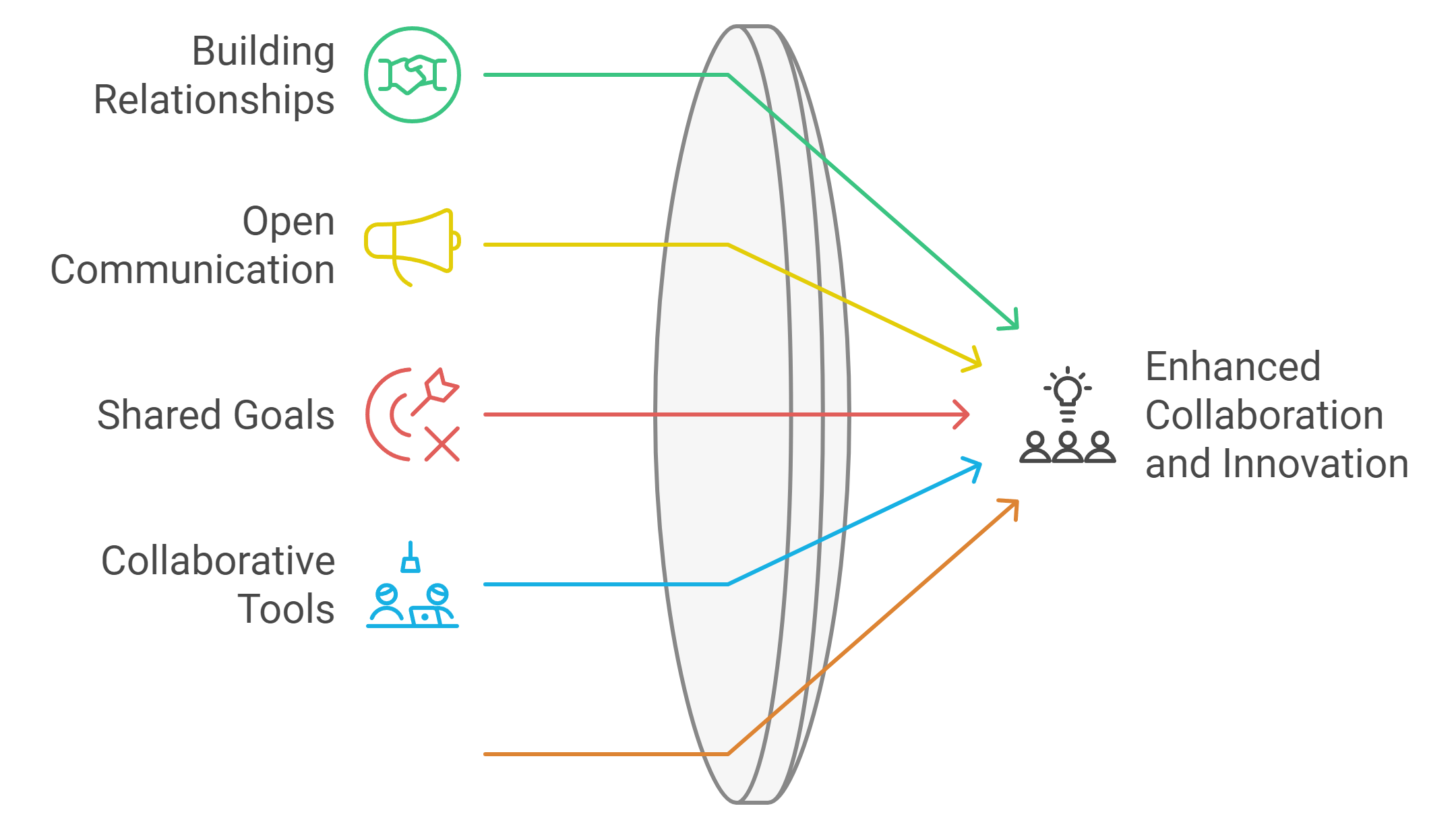
Collaboration thrives in a culture of shared intelligence. Create opportunities for cross-department brainstorming sessions or workshops. These interactions allow teams to exchange ideas and explore innovative solutions. For instance, combining customer feedback from the support team with operational data can lead to improved service delivery.
Here are actionable steps to enhance collaboration:
Host regular meetings: Schedule recurring check-ins with other departments to discuss ongoing projects and share updates.
Create shared goals: Align your objectives with those of other teams to ensure everyone works toward the same outcomes.
Leverage collaborative tools: Use platforms like Slack, Trello, or Microsoft Teams to streamline communication and project management.
"Data-driven operations enable teams to balance workloads and allocate resources efficiently."
Celebrate successes that result from collaboration. Highlight how teamwork led to measurable outcomes, such as increased revenue or improved customer satisfaction. Recognizing these achievements reinforces the value of working together and motivates teams to continue collaborating.
By fostering cross-department collaboration, you position your data team as a unifying force within the organization. This approach not only enhances your impact but also drives innovation and growth across all areas of the business.
Real-World Examples of Data Teams Becoming Strategic Partners
Case Study: DataScience.show's Transformation
DataScience.show serves as a powerful example of how data teams can evolve into strategic partners. Initially, the organization operated under a traditional service desk model. The team focused on resolving immediate issues and fulfilling requests, which limited their ability to contribute to long-term business goals. This reactive approach created silos and prevented the team from showcasing their full potential.
The turning point came when the leadership introduced the Effective Data Leadership program. This initiative emphasized the importance of embedding data into the core of the organization’s decision-making processes. The team began analyzing ticket data to identify recurring patterns and root causes. By addressing these issues proactively, they reduced downtime and improved operational efficiency.
The transformation didn’t stop there. The team deepened their understanding of the business by engaging with stakeholders across departments. They identified challenges in areas like sales forecasting and customer retention. Using advanced analytics, they provided actionable insights that directly impacted revenue growth and customer satisfaction.
"DataScience.show’s journey highlights the power of aligning data strategies with business objectives."
The results were remarkable. The data team transitioned from being seen as a cost center to becoming a trusted advisor. Their proactive approach not only enhanced their reputation but also positioned them as a critical driver of organizational success. This case study underscores the value of adopting a data-driven mindset and fostering collaboration across departments.
Lessons from Industry Leaders
Industry leaders offer valuable insights into how data teams can elevate their roles. Companies like Milestone Tech and Info-Tech Research Group have demonstrated the benefits of transitioning to a data-driven service desk model. These organizations emphasize the importance of leveraging data to inform decisions and improve operations.
One key lesson is the need to adopt advanced analytics tools. Industry leaders invest in platforms that enable real-time data exploration and predictive modeling. These tools empower teams to uncover trends, anticipate challenges, and implement solutions before problems arise. For example, analyzing ticket data helps identify inefficiencies, allowing teams to allocate resources more effectively.
Another critical takeaway is the importance of cross-department collaboration. Successful organizations break down silos and encourage open communication between data teams and business units. This approach ensures that data insights align with broader organizational goals. Leaders like Milestone Tech highlight how shared intelligence fosters innovation and drives meaningful change.
"Collaboration between data teams and business units is essential for maximizing the impact of data-driven strategies."
Finally, industry leaders stress the value of continuous learning. The business landscape evolves rapidly, and staying ahead requires adaptability. Investing in training programs and encouraging a culture of growth helps data teams remain relevant and effective. This commitment to development ensures that teams can meet the changing demands of their organizations.
By studying these examples, you can gain inspiration and practical strategies for transforming your data team into a strategic partner. These lessons demonstrate that with the right mindset, tools, and collaboration, you can unlock the full potential of your data and drive lasting success.
Measuring the Success of Transitioning to a Data-Driven Service Desk
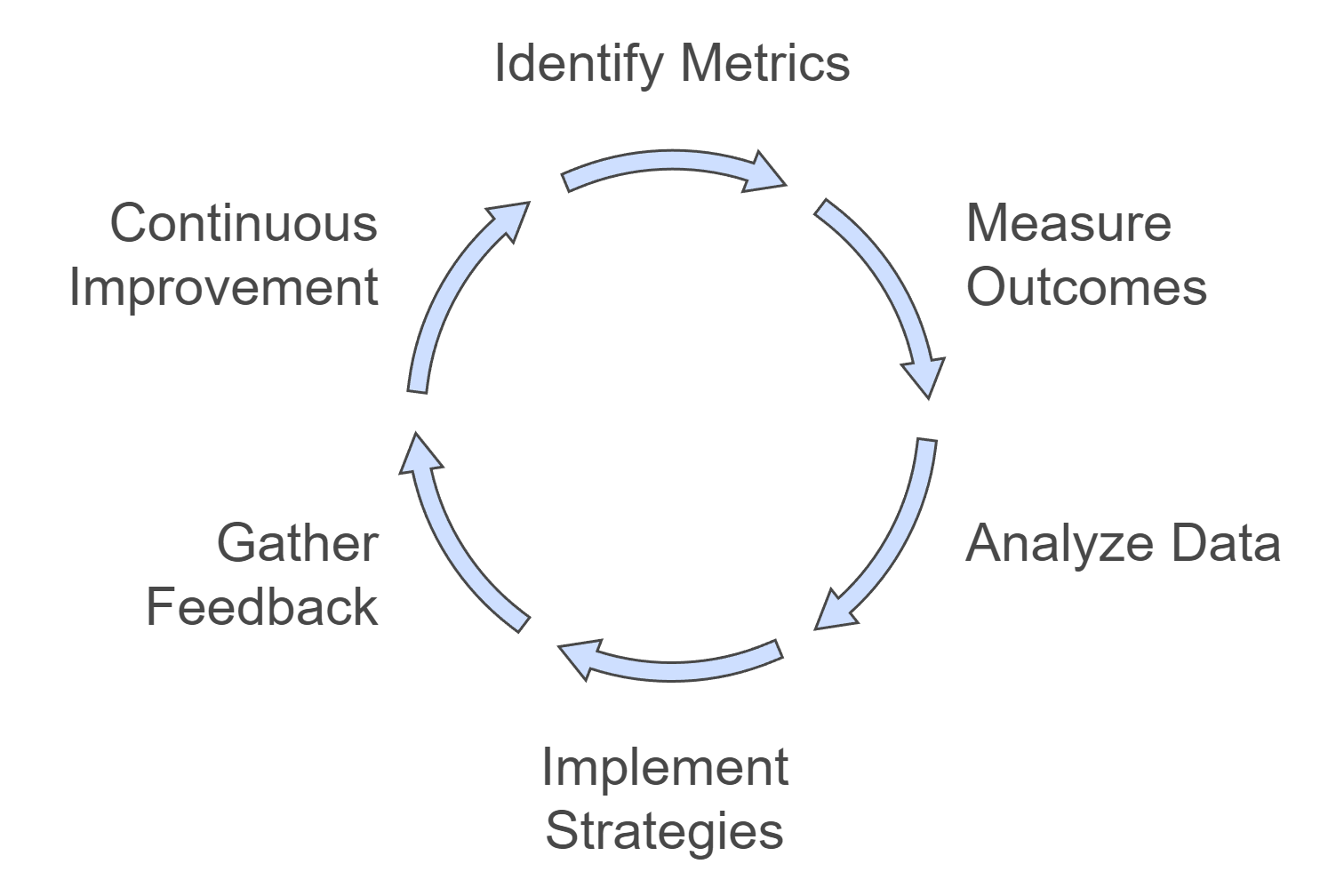
Key Metrics for Success
Measuring your progress is essential when transitioning to a data-driven service desk. Clear metrics help you evaluate your efforts and demonstrate the value your team brings to the organization. By focusing on measurable outcomes, you can track your journey and refine your strategies for greater impact.
Start by identifying metrics that align with your organization's goals. These could include operational efficiency, customer satisfaction, or cost savings. For example, tracking the reduction in ticket resolution times highlights how your proactive approach improves efficiency. Similarly, measuring user satisfaction scores reveals the quality of your service delivery.
Another critical metric is the volume of recurring issues resolved. A data-driven service desk anticipates problems and addresses root causes. By analyzing patterns in ticket data, you can quantify how many recurring issues your team has eliminated. This demonstrates your ability to prevent disruptions and enhance overall productivity.
"Data-driven operations enable teams to balance workloads and allocate resources efficiently."
— Forbes Tech Council
Collaboration metrics also play a vital role. Monitor how often your team engages with other departments and the outcomes of these interactions. For instance, tracking the number of cross-department projects completed successfully showcases your team's ability to foster collaboration and drive organizational improvements.
Finally, measure the financial impact of your efforts. Quantify cost savings achieved through optimized processes or increased revenue generated by actionable insights. These metrics provide tangible evidence of your team's contribution to the organization's success.
Continuous Improvement Strategies
Success is not a one-time achievement. Continuous improvement ensures your data-driven service desk remains effective and adaptable in a dynamic business environment. By embracing a mindset of growth, you can refine your processes and sustain your impact over time.
Begin by conducting regular performance reviews. Analyze your key metrics to identify areas where your team excels and where improvements are needed. For example, if ticket resolution times remain high, investigate the underlying causes and implement targeted solutions. This iterative approach helps you address challenges and maintain high standards.
Encourage feedback from stakeholders to gain valuable insights. Engage with users, department leaders, and team members to understand their experiences and expectations. Use this feedback to fine-tune your strategies and align your efforts with organizational needs. Open communication fosters trust and strengthens your role as a strategic partner.
"Elevating data teams' strategic role enhances not just their effectiveness but also contributes to the overall success of the organization."
— DataScience.show
Invest in ongoing training to keep your team ahead of industry trends. Equip them with advanced analytics tools and techniques to uncover deeper insights. For instance, predictive analytics can help you anticipate future challenges and prepare proactive solutions. Continuous learning ensures your team remains relevant and capable of driving innovation.
Celebrate milestones to motivate your team and reinforce the value of their work. Recognize achievements like resolving recurring issues or completing successful collaborations. Highlighting these successes boosts morale and inspires your team to strive for even greater results.
By focusing on continuous improvement, you create a culture of excellence within your data-driven service desk. This commitment to growth not only enhances your team's capabilities but also solidifies your position as a vital contributor to the organization's long-term success.
The Future of Data Teams as HR Strategic Partners
Emerging Trends in Data and Analytics
The role of data teams continues to evolve, especially as organizations recognize their potential to drive strategic HR initiatives. Emerging trends in data and analytics are reshaping how you approach challenges and opportunities in the workplace. These trends highlight the growing importance of data in transforming HR functions into a more strategic force.
One significant trend is the integration of predictive analytics into HR processes. By analyzing historical data, you can forecast employee turnover, identify skill gaps, and predict workforce needs. This proactive approach allows you to address issues before they escalate, ensuring smoother operations and better resource allocation. For example, predictive models can help you identify employees at risk of disengagement, enabling timely interventions to boost employee engagement.
Another trend is the increasing focus on real-time data insights. Organizations now demand faster, more accurate information to make decisions. Real-time dashboards and analytics tools empower you to monitor key HR metrics, such as recruitment efficiency or employee satisfaction, as they happen. This immediacy enhances your ability to respond to changes and align HR strategies with business goals.
The rise of artificial intelligence (AI) and machine learning also plays a pivotal role in shaping the future of HR. These technologies enable you to automate repetitive tasks, such as resume screening or scheduling interviews, freeing up time for more strategic activities. AI-driven tools can also uncover hidden patterns in data, providing deeper insights into workforce trends and behaviors.
"Data quantifies and measures the business value of the Service Desk, showcasing its potential to drive organizational success."
As these trends gain momentum, your ability to adapt and leverage them will determine your effectiveness as an HR strategic partner. Staying informed about advancements in data and analytics ensures you remain at the forefront of innovation, ready to tackle the challenges of tomorrow.
Preparing for Long-Term Success
To secure long-term success as an HR strategic partner, you must focus on building a strong foundation. This involves aligning your efforts with organizational goals, fostering collaboration, and continuously enhancing your skills and tools.
Start by embedding data into every aspect of your HR strategy. Use data-driven insights to guide decisions on recruitment, training, and employee engagement. For instance, analyzing employee feedback can help you design programs that improve job satisfaction and retention. When you base your strategies on solid data, you demonstrate your value as a trusted advisor to leadership.
Collaboration across departments is essential for achieving long-term success. Break down silos and work closely with teams like IT and finance to create a unified approach to organizational challenges. For example, partnering with IT leadership can help you implement advanced analytics tools that enhance your ability to deliver actionable insights. This teamwork ensures your efforts align with broader business objectives.
Investing in continuous learning is another critical step. The business landscape evolves rapidly, and staying ahead requires adaptability. Attend workshops, enroll in courses, and explore new technologies to keep your skills sharp. Encourage your team to do the same, fostering a culture of growth and innovation. This commitment to development positions you as a forward-thinking leader in the field of strategic HR.
"Only 12% of organizations focus directly on service desk improvement, highlighting the untapped potential for data-driven optimization."
Finally, measure your impact to showcase the value of your work. Track key metrics, such as employee engagement scores or cost savings from optimized processes, to demonstrate how your efforts contribute to the organization's success. Share these results with stakeholders to build trust and strengthen your role as a strategic partner.
By embracing these practices, you prepare yourself for sustained success in the ever-changing world of HR. Your ability to leverage data, foster collaboration, and adapt to new challenges ensures you remain an indispensable asset to your organization.
Transitioning from a service desk to a strategic partner redefines your role and impact within an organization. By embracing this shift, you position yourself as a key driver of business success, capable of transforming data into actionable insights that fuel growth. Investing in advanced tools like data management platforms and fostering collaboration through data collaboration technologies empowers your team to deliver measurable outcomes. Building skills in analytics, communication, and strategy ensures long-term success. This transformation not only elevates your team but also solidifies your place as an indispensable asset in today’s data-driven world.
See Also
Synchronizing Data Teams to Achieve Business Goals
Transitioning from Data Management to Data Leadership
Navigating Obstacles in Effective Data Leadership
